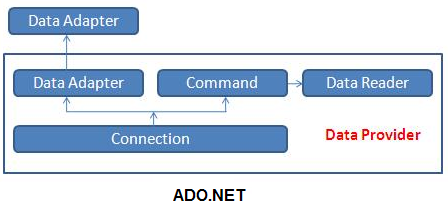What are the advantage of ADO.Net
ADO.NET encompasses a comprehensive set of classes and interfaces within the System.Data namespace, widely recognized and referred to as the standard framework for data access in .NET applications. The ADO.NET data components, when employed within the Visual Studio environment, provide a range of methods to encapsulate data access functionality, greatly facilitating application development by reducing complexities and minimizing errors.
Disconnected Architecture
One of the notable advantages of ADO.NET is its Disconnected Architecture, which contributes to its remarkable efficiency and scalability. The DataSet class, a key component of ADO.NET, operates entirely in a disconnected manner. This distinctive model allows the DataSet to remain agnostic of the data source's origin. As a result, integrating an unlimited number of supported data sources into the codebase becomes a seamless process, ensuring flexibility and future-proofing.

Integrates with Extensible Markup Language (XML)
Moreover, ADO.NET seamlessly integrates with Extensible Markup Language (XML), utilizing its flexibility and widespread acceptance. XML serves as the preferred format for transmitting datasets across networks, enabling any component capable of processing XML to handle data seamlessly. In fact, many ADO.NET classes, such as the DataSet, exhibit a deep intertwining with XML technology, making it an integral part of their functionality and indispensable for their operation.
Direct manipulation of data through SQL
The primary role of ADO.NET data providers is to facilitate direct manipulation of data through SQL. ADO.NET includes a highly optimized SQL Server Data Provider, specifically designed for seamless interaction with SQL Server databases. Using SQL Server's Tabular Data Stream (TDS) format, this data provider ensures efficient exchange of information. Notably, the Advantage ADO.NET Data Provider adeptly handles this process.
Rich object model
Another notable advantage of ADO.NET lies in its rich object model. The entire architecture of ADO.NET is built on a hierarchy of class inheritance and interface implementation. This design philosophy, coupled with a logical organization of features and comprehensive base class support, makes the system remarkably intuitive and user-friendly. Once you explore the namespace and trace the elements you need, you will discover that the inherent inheritance and class relationships greatly simplify usage and enhance overall development experience.